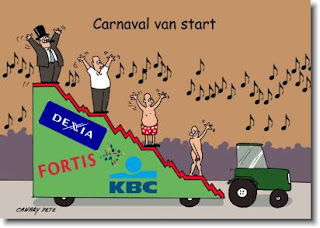vrijdag 17 juli 2009
Where the New Deal went badly wrong
Harold Cole of Penn and Lee Ohanian of UCLA argue that FDR's meddling with markets did more harm than good, lengthening the Great Depression by some seven years. "Indeed, the New Deal is best seen as a cautionary tale for those prepared to rush to regulate the economy. Read the complete article from the Milken Institute here.
Efficiency and beyond
The efficient-markets hypothesis has underpinned many of the financial industry’s models for years. After the crash, what remains of it? Read the complete article here.
The other-worldly philosophers
Although the crisis has exposed bitter divisions among economists, it could still be good for economics. Our first article looks at the turmoil among macroeconomists. Read the complete article here.
National Long-Term Care Insurance: How Much Would It Cost?
About two-thirds of those over 65 will need some long-term care before they die. Howard Gleckman looks at a key question at the heart of the debate over long-term care insurance: how much will premiums cost?
Read the article here.
Give Up A Benefit, Gain Jobs
In this Washington Post commentary, Leonard Burman makes a modest proposal: workers should agree to a cap on tax-free health insurance provided by their employers. This would lead to higher wages and partially protect employees from layoffs.
Read the article here.
Crisisbuffer
Jan Denys over de nadelen... en voordelen van zwartwerk in tijden van crisis. Lees het volledige opiniestuk in De Tijd hier.
Lessons for the future: Ideas and rules for the world in the aftermath of the storm, Part II
What should we conclude about the implications of the global crisis for the future of the world economy? This column, the second of a two-part series, outlines the exit strategies required for fiscal and monetary policy. It says that the crisis ought to be seen as a temporary period of turmoil, rather than a paradigm-shifting event. Read the second part of the column here.
Lessons for the future: Ideas and rules for the world in the aftermath of the storm, Part I
It’s time to start drawing conclusions about the global crisis. This column, the first of a two-part series, assesses the causes and nature of the problems. Although the crisis originated in financial market failings, policymakers are much to blame. Regulatory failure amplified private sector errors, and poorly planned policy responses exacerbated the troubles. Read the first part of the column here.
Learning lessons from private schools
The right and wrong ways to get more poor youngsters into the world’s great universities. Read the complete article here.
Abonneren op:
Reacties (Atom)












